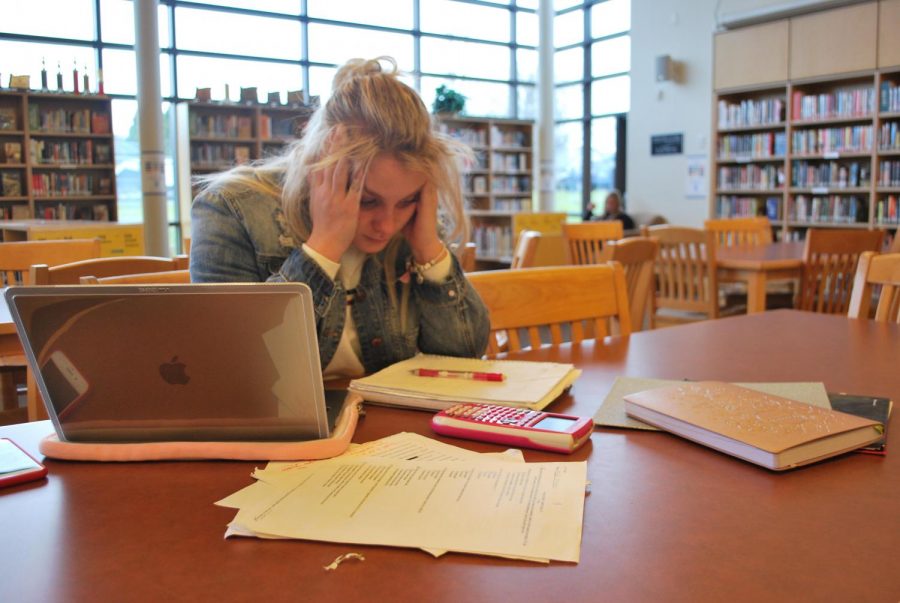Concussions: The Misunderstanding and Lack of Recognition in High School
Last year, about 2.5 million people were diagnosed with concussions.
January 16, 2019
A few months ago, I experienced a serious hit to the head while scrimmaging during a basketball open gym. Fast forward to a week later: I continued to have extreme headaches and dizziness after the blow. When the pain didn’t go away, my parents and I decided to go to the doctor, where I was diagnosed with a severe concussion.
The CDC states that “a concussion is a type of traumatic brain injury—or TBI—caused by a bump, blow, or jolt to the head or by a hit to the body that causes the head and brain to move rapidly back and forth.”
According to the NCAA Concussion Study, most concussions do not last any longer than a week, and only about 10 percent of athletes experience symptoms that go on for more than seven days. Sadly, I am part of this small percentage since mine lasted for almost three months.
As I was trying to recover from this serious injury, I began to realize just how misinformed the community is about concussions.
Typical protocol for the first few days of a concussion consists of lots of rest, no participation in sports or other activities, and no school. As symptoms begin to go away, the allowed workload increases to lightened activities and schoolwork. In serious cases, more long-term academic adjustments may need to be put into place for the student to recover.
Even though I notified the school of my concussion and was trying to strictly follow this protocol, I had to go at it with a slightly different approach. As we all know, La Salle is a very difficult school with a lot of work that students need to get done. I was too worried about falling behind to take the time to properly recover, especially with AP classes in my schedule.
My team of doctors highly recommended cutting back on academics because it had been causing the most increase in symptoms, but because I was scared of falling that far behind in class, I felt obligated to come back to school right away.
Many of my teachers were willing to work with me and be flexible with what I needed to do in order to recover, but because they were not well informed about how severe concussions can affect students, it was difficult for them to help me ease back into things at my own pace.
They would allow me to have more time on assignments, but did not understand that I could barely even read a page of text without my brain feeling completely exhausted. I needed more than just extra time. I needed smaller amounts of work and individualized assignments that would allow me to keep up, but many teachers didn’t have the extra time to create something for me to work with. I ultimately felt pushed to rush back into something my brain could not actually handle.
There are also many misunderstandings when it comes to concussions, since many people have been misinformed of what they actually are. Multiple doctors have told me that a lot of the time, people will assume they have a concussion when it is only muscle pain from a hit to the head, or vice versa where people who have a serious brain injury are never diagnosed due to inaccurate beliefs about the severity of concussions.
It is also common for people to use misleading terms and throw around the term “concussion” because they do not know how else to classify a hit to the head. This has caused the public to have an altered or incorrect perspective on concussions. Many people still don’t even believe that concussions are real.
Since about 2.5 million people were diagnosed with concussions last year, teachers and coaches need to be aware of the difficult effects from concussions that students can struggle with including the long term mental, social, and physical effects.
A different approach needs to be considered to ensure that students can still be able to participate in school and sports while they are trying to recover. I believe it starts with more education and research being done to make sure all students, athletes, parents, coaches, and teachers know how to prevent, recognize, and manage concussions. With a well informed community, teachers will be able to make accommodations for students to continue learning effectively during their recovery period. Educating the public could also help provide more information regarding how to prevent and how to treat concussions.
If teachers really care about the students they teach, they should provide the support and aid for them to recover. It would allow an easier transition for students, like me, if people could understand what is actually going on.







Lisa Moran • Jan 17, 2019 at 7:49 am
Jessie, I couldn’t agree more with everything you said. As teachers, it is extremely important for us to recognize that even though a student with a concussion may be back in our classroom, they may not be cognitively ready to process the information being taught in the class and may not be able to return to a normal homework load for a significant amount of time after injury. Each student and situation is different and it is important to let the student take the lead and let the teacher know what they are honestly capable of completing and it teacher’s role to remain flexible. Thank you for bringing this important issue to the attention of our community.
Vishal • Jan 16, 2019 at 8:12 pm
This is very important! Glad you brought awareness to this important topic.
Mandy • Jan 16, 2019 at 8:10 pm
Great article Jessie! So proud of you for overcoming your concussion and everything that same with it.